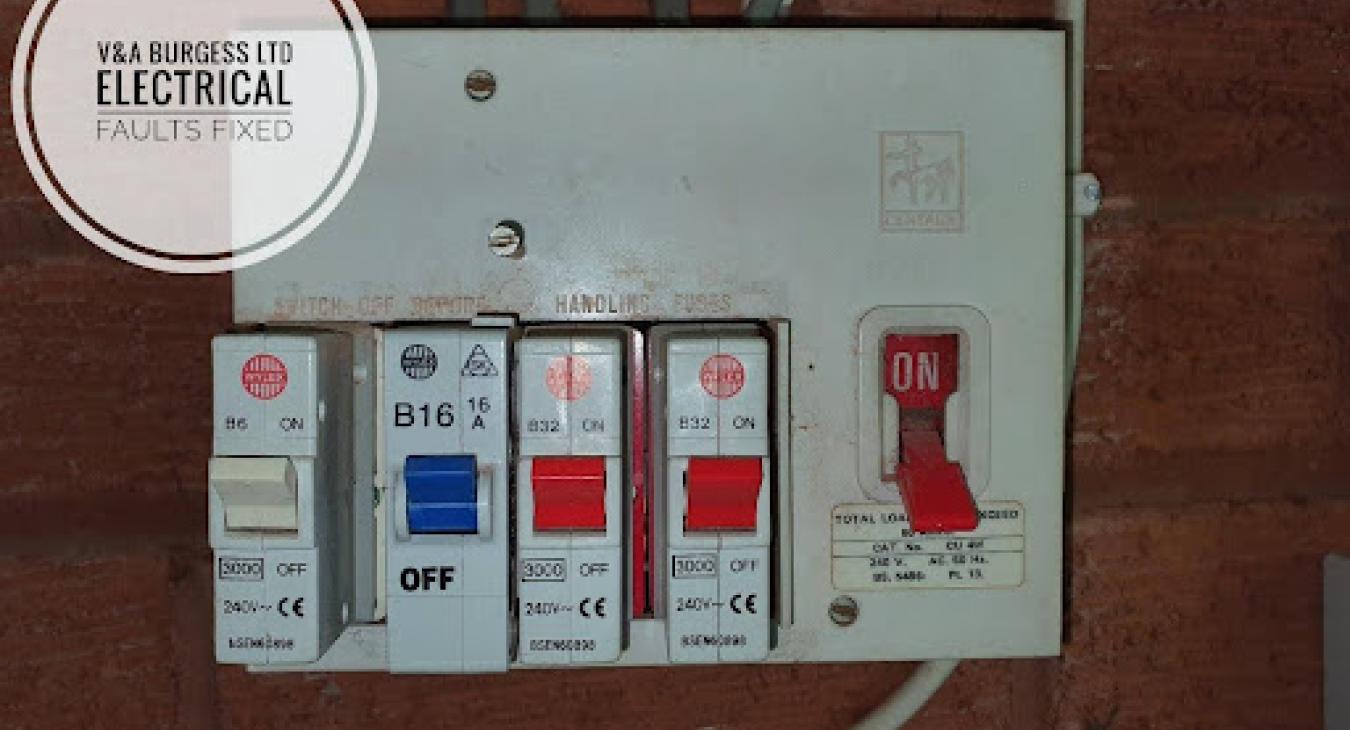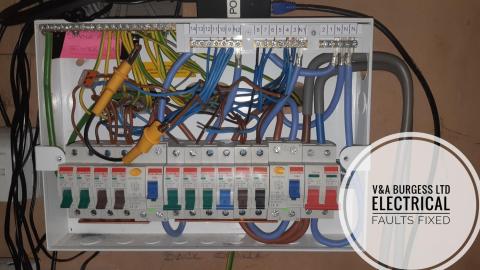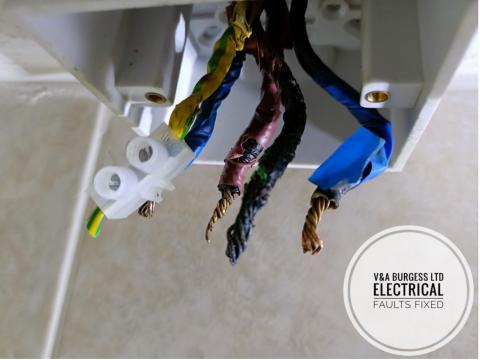
Table of Contents
- We are regularly asked the question “WHEN TO REWIRE A HOUSE” & it’s a fair question.
- How old is the wiring system?
- “Wiring systems don’t last forever”
- What existing problems are you aware of?
- When was the wiring system last inspected and a report produced?
- What is a periodic electrical inspection?
- Don’t have the cheapest electrical inspection carried out!
- How long are you planning to stay in the property?
- What are typical signs that a home needs rewiring?
1) We are regularly asked the question “WHEN TO REWIRE A HOUSE” & it’s a fair question.
Usually asked by a concerned customer following an electrical problem or electrical safety check that has flagged up a few issues. The fact of the matter is that there are several points to consider before we can give you a definitive answer to that. Yes, it’s one of those articles where we blather on for a while then tell you at the end but I promise you will need to read this to see where I’m coming from.
Back to top2) How old is the wiring system?
This may come as a crushing disappointment to some people so I’m just going to say it, like ripping off a band-aid!
Back to top3) “Wiring systems don’t last forever”
So, it’s out there now. The truth is, wiring systems will eventually fail and without warning in some cases. When you call an electrician because the lights have gone off and there are no sockets working there is sometimes the bad news that your electrical wiring has ‘had it’. Many new cables come with a guarantee of 10 years from the manufacturer, yes you read that right, 10 years! Now that’s not to say that the wiring won’t last longer than 10 years, in fact it is highly likely to last far longer than that but you are also highly likely to develop problems if it is not maintained over its lifespan. We come across wiring systems that have been installed in the 1960’s which are still in service making them 60 years old. They need some work carrying out in a lot of cases and testing reveals often that the cabling is not far from needing replacing. These older systems are only still in service because the use has been very kind to them over the years. The kind of people that live alone without a large family, rarely use any heavy power draw type appliances, and have never touched the wiring, carried out DIY electrics on the bank holiday weekends or had any alterations done to mess with the original system.
Back to top4) What existing problems are you aware of?
If you have some existing issues that you are aware of then now is the time to be honest with yourself.
- Does that socket work?
- Did it used to work and you ignored it and started using a different one?
- Did you ever think WHY it failed?
The truth is, we have all done it. When things break, we put it on the to-do list. Must find an electrician to come and sort this problem and that problem but then life gets in the way and it gets forgotten. Meanwhile, the socket may have stopped working due to loose wiring at the rear. Loose wires can cause fires and if you are lucky, just burnt cabling and socket circuit failure. That is just one of the possibilities of course for the socket failing. My point is, if there are issues like this in your electrical system then it is time it was checked out properly and any maintenance issues rectified. Perhaps a new consumer unit is recommended or there are hidden breaks on one or more circuits, earthing issues that would not be known about and so on. Which brings me on to my next point…..
Back to top5) When was the wiring system last inspected and a report produced?
This is certainly not the first time this year I have written about the importance of Periodic Inspection and Testing on electrical systems and it won’t be the last either but nevertheless, I’m rambling on about it again.
Back to top6) What is a periodic electrical inspection?
Quite simply, it is the process whereby an electrician examines the fuse box, consumer unit, electrical circuits and the earthing of the electrical system and using electrical regulations as guidance, determines the suitability of the electrical installation for continued use. I make it sound so simple. 😊 The electrical inspection takes several hours when carried out thoroughly and the document you receive is a technical 6–8-page report which will detail anything that is wrong with your electrical system and any areas which it does not meet the current regulations.
Whilst the electrics may seem to work fine under normal circumstances, we check that the safety devices will operate as intended during electrical faults. Your airbags in your car will hopefully never be used but I bet you want to know they work properly, don’t you? How about the seat belts? Do they matter? Should we bother having them as they really don’t do a great deal 99.999% percent of the time do, they? This is where it gets interesting with electrics. There are safety features of a modern electrical system that you will never use, or hopefully never. When the need arises though, they could save your life.
7) Don’t have the cheapest electrical inspection carried out!
If the inspector is not there for at least a few hours, there is every chance they have achieved the electrical equivalent of sticking saw dust in the gearbox and rubber stamped something that could have hidden defects. Electrical inspection are a technical and importance process that requires time to complete thoroughly.
Back to top8) How long are you planning to stay in the property?
An honest question. If you are planning on selling the place in the next year or so and know the wiring system is shot then don’t bother thinking about WHEN TO REWIRE A HOUSE, if however, you are planning on staying there until the end of your time then it may be worth the investment. We would always recommend getting the inspection carried out first before simply throwing thousands at a new wiring system. Your electrician may come back with a pleasant surprise of a “New Consumer Unit” or some faults to put right. It does all depend on the results of the report, we never push our clients into decisions and always just give them the facts. Apart from anything, we don’t like a rewire, really, we don’t. They are messy, hard work and we often don’t have the time for a long job like that in our diary. So, if we tell you your home needs a rewire, then it’s not because we are short of work this month. It is because we genuinely mean it. We do have some trusted contacts that may be able to assist with this kind of job, IF it is necessary so we won’t ever leave you hanging.
Back to top9) What are typical signs that a home needs rewiring?
Old looking fuse box – This kind of goes without saying, I guess. If the fuse box looks ancient then your wiring is also going to be ancient and at least the same age as the fuse box if not older. If your Fusebox looks like the one in the photograph then it’s around 40+ years old roughly. As a minimum get it checked and replaced if its suitable to do so.
- Flickering lights – not always a sign of an impending rewire to be honest. Flickering lights can be caused by a variety of different issues and there is more information about that here:
https://www.electricalfaultsfixed.co.uk/blog/lights-flickering-house - Sockets mounted in the skirting board – That’s right. We stopped doing this decades ago. It was silly, we realised so stopped. Sockets mounted in the skirting boards are a good indication that the wiring may be really old. It is entirely possible that a lazy rewire was done at some point and used the same positions for the sockets of course, in any event, get it checked.
- Lights mounted near windows in bedrooms – This was done back in the day for reasons that I still am not 100% sure of. Some say it was so there would be no silhouette cast on the curtains when getting changed for bed. Some say it was to stop people seeing in from outside as easily.
If your lights are not mounted in the centre of the bedrooms then its and indication that the wiring may be old. - A single socket in each room – Just after we stopped grinding sticks together to make fire and brought electric into homes it was decided that we would never need more than one of these mystical socket things in each room. This was decades ago and since then we have moved on and actually find sockets quite useful. Sometimes lots of extra sockets have been added on to older wiring systems which can cause problems but I digress. If you have a single socket in each room then it’s a good indication that your wiring system may be getting old and heading towards needing a rewire.
- Rubber or lead wiring – WHEN TO REWIRE A HOUSE? When you have rubber or lead sheathed cables. These types of cables were no longer installed from around 1950 (ish). If you have old rubber cabling in your home then it is highly likely that the rubber has degraded into fragile and dangerous crumbs or close to it. These cables have served their useful life now and should be replaced. This will be highlighted on an electrical inspection and advice given.
For more information on electrical inspections and what is involved, see our electrical safety checks page here: https://www.electricalfaultsfixed.co.uk/electrical-safety-checks-eicr
Back to top










